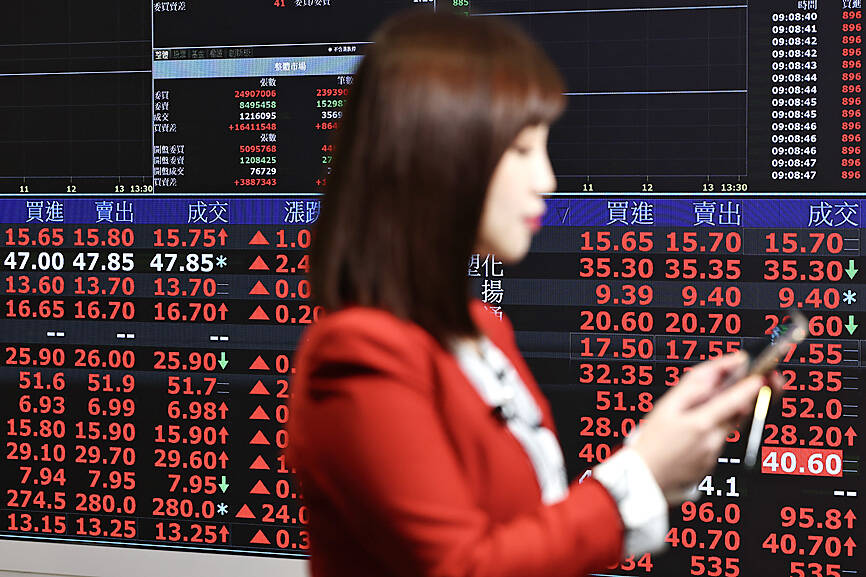Tax revenue last month fell 2.8 percent year-on-year to NT$232.4 billion (US$7.15 billion), as fears of potential US tariffs on all imports spooked investors around the world and dampened securities trading in Taiwan, the Ministry of Finance said yesterday.
Tax revenue from securities transactions posted the steepest decline among all major categories, plunging 24.6 percent — or NT$7.2 billion — to NT$21.9 billion, the lowest in 26 months, the ministry’s monthly report showed.
Average daily turnover of the local stock market fell to NT$400.4 billion, down 27.4 percent from a year earlier and hitting the lowest in 14 months, it added.

Photo: CNA
The drop followed US President Donald Trump’s hawkish and unpredictable tariff talks, which unsettled global financial markets and drove investors to the sidelines, the ministry said.
Meanwhile, personal income tax revenue declined 14.1 percent year-on-year to NT$34.9 billion, which the ministry attributed to an unfavorable comparison base due to the timing of the Lunar New Year holiday.
This year, the holiday fell mainly in January, while last year it occurred entirely in February — delaying some year-end bonuses and associated tax withholdings to March, the ministry said.
However, not all tax categories recorded declines.
Business tax revenue rose 5.7 percent to NT$110.9 billion, buoyed by steady domestic demand and robust exports, as companies front-loaded shipments amid Trump’s tariff threat, it added.
In the first quarter of this year, total tax revenue amounted to NT$554 billion, down 0.6 percent from the same period last year and slightly below the ministry’s budget target, the report said.
The most significant declines were in securities transaction tax, business tax and commodity tax revenues, which fell NT$5.2 billion, NT$4.3 billion and NT$3.3 billion respectively, compared with the January-to-March period last year, the ministry said
The declines were partially offset by a NT$12.8 billion increase in personal income tax revenue, driven by wage growth and higher cash dividends distributed by listed firms, it said.

STEEP DECLINE: Yesterday’s drop was the third-steepest in its history, the steepest being Monday’s drop in the wake of the tariff announcement on Wednesday last week Taiwanese stocks continued their heavy sell-off yesterday, as concerns over US tariffs and unwinding of leveraged bets weighed on the market. The benchmark TAIEX plunged 1,068.19 points, or 5.79 percent, to 17,391.76, notching the biggest drop among Asian peers as it hit a 15-month low. The decline came even after the government on late Tuesday authorized the NT$500 billion (US$15.2 billion) National Stabilization Fund (國安基金) to step in to buoy the market amid investors’ worries over tariffs imposed by US President Donald Trump. Yesterday’s decline was the third-steepest in its history, trailing only the declines of 2,065.87 points on Monday and

TAKING STOCK: A Taiwanese cookware firm in Vietnam urged customers to assess inventory or place orders early so shipments can reach the US while tariffs are paused Taiwanese businesses in Vietnam are exploring alternatives after the White House imposed a 46 percent import duty on Vietnamese goods, following US President Donald Trump’s announcement of “reciprocal” tariffs on the US’ trading partners. Lo Shih-liang (羅世良), chairman of Brico Industry Co (裕茂工業), a Taiwanese company that manufactures cast iron cookware and stove components in Vietnam, said that more than 40 percent of his business was tied to the US market, describing the constant US policy shifts as an emotional roller coaster. “I work during the day and stay up all night watching the news. I’ve been following US news until 3am

Six years ago, LVMH’s billionaire CEO Bernard Arnault and US President Donald Trump cut the blue ribbon on a factory in rural Texas that would make designer handbags for Louis Vuitton, one of the world’s best-known luxury brands. However, since the high-profile opening, the factory has faced a host of problems limiting production, 11 former Louis Vuitton employees said. The site has consistently ranked among the worst-performing for Louis Vuitton globally, “significantly” underperforming other facilities, said three former Louis Vuitton workers and a senior industry source, who cited internal rankings shared with staff. The plant’s problems — which have not

TARIFF CONCERNS: The chipmaker cited global uncertainty from US tariffs and a weakening economic outlook, but said its Singapore expansion remains on track Vanguard International Semiconductor Corp (世界先進), a foundry service provider specializing in producing power management and display driver chips, yesterday withdrew its full-year revenue projection of moderate growth for this year, as escalating US tariff tensions raised uncertainty and concern about a potential economic recession. The Hsinchu-based chipmaker in February said revenues this year would grow mildly from last year based on improving supply chain inventory levels and market demand. At the time, it also anticipated gradual quarter revenue growth. However, the US’ sweeping tariff policy has upended the industry’s supply chains and weakened economic prospects for the world economy, it said. “Now